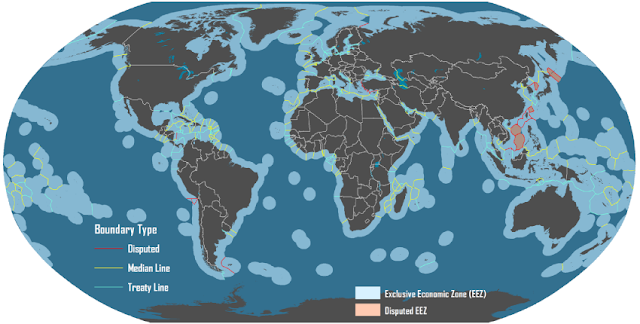We must remember that our EEZ (Exclusive Economic Zone) is ours to exploit exclusively for economic purposes but is NOT forbidden to China, Taiwan, Malaysia or to any other foreign ships, not even to armed warships, but THERE ARE CERTAIN RESTRICTIONS FOR ANY FOREIGN SHIP TO USE OUR territorial seas or to pass through our EEZ. Ships entering our territorial seas must invoke RIGHT OF INNOCENT PASSAGE. In doing so, they are recognising our sovereignty rights and our right to the our seas.
International or foreign flag bearing ships are allowed to go through PH waters. However, foreign armed vessels MUST invoke right of innocent passage. Foreign ships, especially armed ships that do not invoke this basic international law of the sea may be considered to potentially cause us prejudice and can be considered "hostile."
If, for instance, China Navy refuses to do it, they are, in effect, telling our government that they do not recognise those waters as Philippine EEZ. In such a case, China PLA navy ships cruising through our waters are doing it without permission and may be considered hostile as in "armed and dangerous" and can be classified as enemy warships.
So, what is Right of Innocent Passage?
As summed up by the US Dept of Defense:
It is the right of all ships to engage in continuous and expeditious surface passage through the territorial sea and archipelagic waters of foreign coastal states in a manner not prejudicial to its peace, good order, or security. Passage includes stopping and anchoring, but only if incidental to ordinary navigation or necessary by force majeure or distress, or for the purpose of rendering assistance to persons, ships, or aircraft in danger or distress. ~~ Dictionary of Military and Associated Terms. US Department of Defense 2005.A more comprehensive definition of Right of Innocent Passage: A term of international law referring to a ship or aircraft's right to enter and pass through another's territory so long as it is not prejudicial to the peace, good order or security of the other state.
The right to innocent passage has been codified in the United Nations Convention on the Law of the Sea of December 10, 1982, extracts from 17 and 19 follow:
"... ships of all States, whether coastal or land-locked, enjoy the right of innocent passage through the territorial sea.
"Passage is innocent so long as it is not prejudicial to the peace, good order or security of the coastal State. Such passage shall take place in conformity with this Convention and with other rules of international law.
"Passage of a foreign ship shall be considered to be prejudicial to the peace, good order or security of the coastal State if in the territorial sea it engages in any of the following activities:
NB: Even United States Navy warships do not just cruise through our waters without "permission" - it is a courtesy required of all navies to perform as part of the International Law of the Sea on Right of Innocent Passage.
- any threat or use of force against the sovereignty, territorial integrity or political independence of the coastal State, or in any other manner in violation of the principles of international law embodied in the Charter of the United Nations;
- any exercise or practice with weapons of any kind;
- any act aimed at collecting information to the prejudice of the defence or security of the coastal State;
- any act of propaganda aimed at affecting the defence or security of the coastal State;
- the launching, landing or taking on board of any aircraft;
- the launching, landing or taking on board of any military device;
- the loading or unloading of any commodity, currency or person contrary to the customs, fiscal, immigration or sanitary laws and regulations of the coastal State;
- any act of wilful and serious pollution contrary to this Convention;
- any fishing activities;
- the carrying out of research or survey activities;
- any act aimed at interfering with any systems of communication or any other facilities or installations of the coastal State;
- any other activity not having a direct bearing on passage."
~~ Admins, Defenders of the Philippine Sabah & Spratly Claims
01 June 2013
Source: Duhaime Legal Dictionary



No comments:
Post a Comment